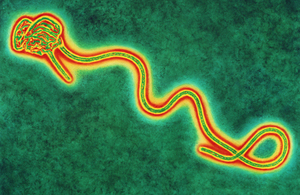PHE reaffirms commitment to supporting Ebola outbreak response but risk remains low in England
WHO has declared Ebola a Public Health Emergency of International Concern.

Ebola
Public Health England (PHE) has reaffirmed its commitment to supporting global efforts to arrest the outbreak of Ebola in West Africa following today’s World Health Organization (WHO) announcement.
The WHO Emergency Committee announced today (8 August 2014) that the ongoing Ebola outbreak in West Africa has met the conditions for a Public Health Emergency of International Concern.
WHO has made several recommendations for affected countries, which centre around them declaring a national emergency, activating national disaster and emergency management mechanisms, ensuring the provision of quality clinical care and improving the safety and protection that health care workers receive.
They also recommend that the affected countries should conduct exit screening for unexplained illness consistent with potential Ebola infection and that Ebola cases or contacts should not undertake international travel, unless the travel is part of an appropriate medical evacuation. For unaffected states the WHO confirmed there should be no general ban on international travel or trade.
For people in the UK, there is no change in the current risk assessment which remains very low. No cases of imported Ebola have ever been reported in the UK and the risk of any traveller to West Africa contracting Ebola is very low without direct contact with the blood or body fluids of an infected person.
PHE will continue to work with government colleagues, the WHO and a wide range of partners including UNICEF, Médecins Sans Frontières (MSF), to provide support to the affected countries. This includes deployment of 10 PHE staff to support international efforts and offer support on the ground in West Africa.
Within the UK, PHE has informed medical practitioners about the situation in West Africa and requested they remain vigilant for unexplained illness in those who have visited the affected area, and actions to take in the event of a possible case.
Dr Brian McCloskey, director of global health at PHE, said:
The measures recommended by WHO are needed to ensure everything that can be done to control the outbreak, is being done. We will continue to support global efforts to arrest the impact of Ebola in West Africa, including deploying Public Health England staff to the affected areas to provide strategic and public health support.
As we have seen with Middle Eastern Respiratory Syndrome, we have robust mechanisms in place for detecting and responding to any usual infections within the UK, but ultimately the best possible defence will be ensuring the outbreak in West Africa is brought under control.
Though it is possible a case could be identified in the UK in a person returning from an affected country, this is unlikely. Even if a case were identified, there is minimal risk of it spreading across the general population as UK hospitals are well prepared to handle infectious diseases. Ebola causes far more harm in countries with less developed healthcare facilities and public health capacity.
Ebola is a form of viral haemorrhagic fever and currently more than 1,500 cases have been reported in Guinea, Liberia and Sierra Leone, of which there have been more than 900 deaths. This is the first documented Ebola outbreak in West Africa, and it is the largest ever known outbreak of this disease.
Timeline of events:
- February 2014 - outbreak of a haemorrhagic illness in south-east Guinea
- March 2014 - outbreak of Ebola confirmed in south-east Guinea
- Later that month, tests confirm Ebola has spread into Liberia
- May 2014 - Sierra Leone confirms Ebola has spread to the Kailahun district, east of the country
- June 2014 - MSF declares the Ebola outbreak is out of control
- July 2014 - first case of Ebola confirmed in Nigeria
- July to August 2014 - 2 cases diagnosed in American healthcare workers in Liberia, both have been evacuated to the US for treatment
PHE has published a risk assessment of the current Ebola outbreak for the UK resident population and UK citizens in West Africa.
PHE has also published advice for humanitarian workers working in the affected areas and also a general information factsheet.
More information on Ebola is available from NHS Choices.